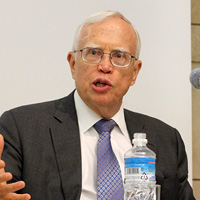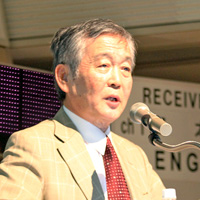Information
- Time and Date: 15:30 - 17:30, Wednesday, October 8, 2014
- Venue: Shin-Kasumigaseki Bldg Lobby Floor, 3-3-2 Kasumigaseki, Chiyoda-ku, Tokyo
- Speaker: James J. HECKMAN (Nobel Laureate in Economics, Professor at the University of Chicago / Economic Opportunity Working Group for New Economic Thinking)
Faced with an aging population combined with a low fertility rate as well as widening economic disparities, Japan urgently needs to better utilize its human resources through effective education and narrow its disparities in access to educational resources. Against this backdrop, we invited Nobel laureate Professor James Heckman to give a presentation entitled "Creating Capabilities." He introduced various studies from the perspectives of economics, psychology, and neuroscience on the creation of capabilities that function in economic activities and the entire society, and demonstrated their implications for policies to promote the development of capabilities and to analyze poverty, social mobility and economic and social opportunities. The lecture was followed by comments and a question-and-answer session with related researchers who had further discussions on such topics as non-cognitive and cognitive capacity development, family environment and capability disparities, and capabilities in different stages of the life cycle.
Opening remarks
NAKAJIMA Atsushi (Chairman, RIETI)
Japan is faced with an increasingly aging population combined with a low fertility rate and therefore must better utilize and develop its human resources regardless of gender or age. At the same time, expanding economic disparities, including being the worst among the Organisation for Economic Co-operation and Development (OECD) countries in terms of the poverty rate of single-mother families, are also a priority issue requiring further attention. Against this backdrop, an important point is how to prevent these disparities from continuing and decreasing them through effective education and human resources development. I am certain that today's special lecture by Professor Heckman will offer us numerous suggestions and insights into solving the variety of serious challenges facing Japanese society and expect that it will be significantly fruitful.
Presentation
HECKMAN
Inequality is on the rise around the world. In Japan, for family income after taxes and transfers, there is a slight upward trend in the Gini coefficient from 1985 through 2010. Wealth inequality and poverty rates are other ways of measuring inequality and also show upward trends. Poverty in Japan is especially striking among single parents where there is a high rate with an upward trend. Based on self-assessments, single parent mother-headed households in Japan are showing signs of stress. This is partly caused by gender inequality. The largest differences in hourly wages between men and women are found in the part time sectors.
 Inequality is empirically associated with social mobility. The "intergenerational elasticity" (IGE) refers to the income of children compared to that of their parents. It is a measure of immobility in economic status across generations: the greater the IGE, the greater the immobility. A plot of the IGE against the Gini coefficient shows a positive relationship. More inequality in the cross-section is associated with greater dependence of a son's income on his father's income (i.e., a higher IGE). The evidence from Japan falls along a cross-country curve relating income inequality and intergenerational elasticities: the intergenerational elasticity for Denmark is 0.15 and 0.47 for the United States and the United Kingdom. For Japan, it is about 0.4.
Inequality is empirically associated with social mobility. The "intergenerational elasticity" (IGE) refers to the income of children compared to that of their parents. It is a measure of immobility in economic status across generations: the greater the IGE, the greater the immobility. A plot of the IGE against the Gini coefficient shows a positive relationship. More inequality in the cross-section is associated with greater dependence of a son's income on his father's income (i.e., a higher IGE). The evidence from Japan falls along a cross-country curve relating income inequality and intergenerational elasticities: the intergenerational elasticity for Denmark is 0.15 and 0.47 for the United States and the United Kingdom. For Japan, it is about 0.4.
Economic theory links income inequality and intergenerational mobility. Less income-advantaged families face difficulties in financing their children's education, and in providing other opportunities for them. This is a serious concern in many places around the world. Some economic theories claim that inequality is a cause of immobility. On the other hand, the causality might be reversed. My late colleague Gary Stanley Becker argued that higher intergenerational elasticities could explain greater inequality in income in the cross-section. People who have an advantage at birth by being born into better circumstances pass advantage on to their children, thereby creating greater inequality in society across generations.
On income redistribution
Some researchers conclude from the relationship between inequality at a point in time and the intergenerational elasticity that income redistribution can play a major role in promoting social mobility. However, this is not necessarily a correct conclusion based on the available evidence.
The traditional Western welfare state is based on "alms to the poor," i.e., redistribution. What are effective policies to foster social inclusion to reduce economic and social inequality, and to promote social and economic opportunity? Famous economists such as Frank Ramsey and James Mirrlees have talked about ways to combat inequality based on efficient transfer systems to keep incentives for individuals to work while increasing the social pie. One recurrent theme in this discussion is the tradeoff between inequality and efficiency. Reducing inequality by transfers reduces economic efficiency by taxing individuals and distorting incentives. This approach is a static one that only looks at the effect of taxation and redistribution on behavioral responses.
A complementary approach can be more effective in reducing long-run poverty and promoting social mobility. It is a broader strategy of human development that addresses the questions of inequality and opportunity. Based on studies of inequality in Japan, Western Europe, and the United States, skills are major determinants of inequality. People generally do better if they have more education, on-the-job training, and other skills.
Today I want you to consider a strategy of creating capabilities. I use the words "capabilities," "capacities," and "skills" as synonyms. Enabling people and creating capabilities allow people to flourish while reducing inequality and promoting economic efficiency. Instead of a strategy of "alms to the poor," think about how to create capabilities and empower people.
Having "capabilities" means being a functioning agent in the economy and society at large. Amartya Sen and Martha Nussbaum defined capabilities as "…the real freedoms people have to achieve and the beings and doings that they value and have reason to value." "Creating capabilities" is not a strategy for shaping people to behave in any particular way, but to shape their possibilities, allow them to choose who they can be, and provide them the maximum flexibility in responding to life challenges. People with larger capability sets have more freedom to shape their own lives. Those with fewer capabilities have more limited choices.
Eight lessons from the recent literature on creating capabilities
The first lesson is that multiple skills vitally affect performance in life across a variety of dimensions. Evidence shows that cognitive and non-cognitive skills affect labor market outcomes, the likelihood of marriage and divorce, the likelihood of receiving welfare, voting, and health. Non-cognitive skills include preferences, self-control, conscientiousness, staying on task, and engaging in a variety of social and economic transactions. They affect a range of behaviors. The multiplicity of skills is often overlooked, but it is important.
The second lesson is based on the research of child development experts, economists, neuroscientists, and sociologists. Gaps in both cognitive and non-cognitive skills across socioeconomic groups open up at early ages. Skill gaps open up even before children go to school, and in advanced societies like Japan, schooling itself does not have much effect on reducing the gaps.
The third lesson is in the role of genetics in the emergence of skill gaps. It makes sense that smart parents can earn more, achieve more, and pass on their genes to smart children. However, empirical, experimental, and non-experimental research also shows the power of parenting and environments in shaping skills. Heritability is important, but there is mounting evidence that gene expression can be modified, especially by early environments.
The fourth lesson is that there are critical and sensitive periods in child development. Different capacities are malleable at different stages of life. The intelligence quotient (IQ) becomes rank stable around the age of 10. Early life disadvantage shapes intelligence and other outcomes. However, children still have malleability in non-cognitive skills into their young adult years, which suggests a strategy of different types of interventions at different life stages.
The fifth lesson is that we find substantial differences in children's environments. Children with professional parents hear four times as many words at age three than those from disadvantaged families. This, along with parenting style, affects the development of children.
The sixth lesson is that there is resiliency over the life cycle. Initial disadvantage has a lingering effect, but society can partially compensate for this. The most effective adolescent interventions in children with neglected childhoods target the formation of personality, socio-emotional, and character skills through mentoring, and providing guidance and information. What happens in a successful family mirrors successful workplace environments, job training programs, and apprenticeship programs.
The seventh lesson is the importance of "scaffolding." This means staying with a child or adolescent, working with them, and challenging them to take the next step in the "proximal zone" of development. Lecturing a child is not as effective as engaging and interacting with them. Both the child and the teacher (or parent) in this relationship play roles similar to an "emergent system" as described by system dynamics theory.
The eighth lesson is the value of early investment. High quality interventions targeted to the early years are effective in promoting skills, which is a manifestation of "dynamic complementarity." A strong skill base today will create a larger one for tomorrow. Adolescents who have more ability and motivation make the best investments in schooling. Abilities are created through early investments and throughout the life cycle, and are not determined simply by genes. Instead of "alms to the poor," I propose "pre-distribution"—early skill formation—as an effective skill enhancement strategy.
A comprehensive understanding of capability formation
In devising effective social policy to promote skills, we need to think about the skills that we should target at each stage of the life cycle. This nuanced view is in contrast to the fragmented approaches of many governments that ignore the importance of skills. Examples of fragmented solutions include adding to police forces to combat crime or hiring doctors to improve health. Such measures may be effective, but strategies based on preventing problems are often even more effective. We need a unified strategy focusing on capabilities that avoids relying exclusively on these fragmented remediation-based solutions. In the case of skill development, it is frequently more effective to promote skills early on to prevent problems rather than focusing on treatment after problems occur.
To create effective strategies for capability formation, we need to understand the roles of family life, multiple capabilities, and the dynamics of capability formation. Low levels of capabilities explain social problems such as crime, teenage pregnancy, low wages, and poor health. Japan focuses on the Programme for International Student Assessment (PISA) test scores. However, recent studies on the economics of skills show that cognitive skills are only part of the story of what makes for successful lives. Personality/soft skills and physical and mental health are often neglected, yet they are very important.
Schools, individuals, and nations help shape cognitive and non-cognitive skills. The family lives of children are major producers of cognitive and socio-emotional skills. Supplementing the family and its resources, enriching the lives of children, and supporting children in school can be effective strategies. By supplementing the family, we can promote skills and create policies that avoid focusing solely on fragmented solutions. Instead of one cabinet agency for each problem, there should be one cabinet agency for promoting capabilities and skills. Interventions that promote skills have high benefit-cost ratios and rates of return and have no equality-efficiency tradeoff. What is fair is also economically efficient. Enhanced skill bases create economic productivity, reduce inequality, and promote social mobility.
The importance of cognitive and character skills
 Psychologists have come up with five measures of personality traits: openness to experience, conscientiousness, extraversion, agreeableness, and neuroticism/emotional stability. Those with high cognitive and non-cognitive ability are not likely to go to jail. However, those with low cognitive and non-cognitive skills are more likely to go to jail.
Psychologists have come up with five measures of personality traits: openness to experience, conscientiousness, extraversion, agreeableness, and neuroticism/emotional stability. Those with high cognitive and non-cognitive ability are not likely to go to jail. However, those with low cognitive and non-cognitive skills are more likely to go to jail.
Each year, the General Educational Development (GED) test is taken by 15% of all students obtaining certificates for completing secondary school in the United States. High school dropouts take this exam to secure high school equivalency. GED certificate holders and high school graduates have about the same levels of cognitive skills. High school dropouts who do not take the GED have lower cognitive skills. However, GED certificate holders earn about the same as high school dropouts and make much less than high school graduates. High school dropouts and GED certificate holders also have similar non-cognitive skills, which explains this income gap.
Non-cognitive skills can be reliably measured. A new OECD report gives evidence on this question. Personality traits are patterns of behavior that are measured by performance on tasks measuring character and cognitive skills. Recent research shows how reliable measures of non-cognitive skills can be constructed from behaviors.
The Japanese research literature confirms studies conducted in the United States and in Western Europe. There are substantial gaps in cognitive scores between children of highly skilled parents and children of the less educated. Children of mothers who graduated from college perform much better on tests. Even at age three, gaps show up, and there are similar gaps in non-cognitive skills. Data from the work done by Hamano in Japan show similar gaps in the lexical ability of children based on family annual household incomes. Hideo Akabayashi shows that mathematical skills are higher for children with more educated mothers and from families with higher incomes.
How do we interpret this evidence and create an effective economic and social policy for skill formation? The quality of home environments by family type is predictive of adult success. Yukichi Fukuzawa believed that individual differences came down solely to differences in education, not in genetics. Although that position is too extreme, "education"—broadly defined—plays a powerful role in shaping outcomes.
Variation in family environments
Studying family environments in the United States, psychologists found that children of the advantaged hear nearly four times more words in an hour than those of the disadvantaged. There is also more encouragement of children among the more affluent and educated families and much less encouragement among the disadvantaged. This leads to large differences in vocabulary at age three. In Japan, educated mothers are more likely to take their children to museums, read books to them, and provide them with an important "verbal bath."
Families are changing around the world. 30% of children in the United States are in single parent families. Those families generally have fewer resources to make investments in the child. There is a secular increase in never-married single parent households with children under the age of 18. A similar but less striking pattern is true in Japan.
In the United States, children with greater ability are more likely to go to college. Family income also plays a role. Even for children at the bottom of the ability distribution, affluent families are more likely to send their children to college than those that are less affluent. In Japan, there is a strong correlation between family income and whether children will attend a four-year college.
What does all this mean for social policy? The intergenerational elasticity in Denmark is low at 0.15, whereas in Japan it is about 0.4. Many look at Denmark, Norway, and Sweden as ideals of low inequality. Social mobility is higher in those countries than in the United States and Japan and income inequality is lower. Yet there are small differences in the relationship only in the mother's education and the child's high school completion rate between the United States and Denmark. This is despite the fact that college tuition is free in Denmark, and there is a low level of inequality. Regardless of free tuition and a generous welfare state, parental education still plays a powerful role in both societies, and the statistics in Denmark are eerily similar to those of the United States. In both the United States and Denmark, there is a pattern where both parental income and wealth positively affect cognitive skills. Therefore, family advantage/disadvantage plays a similar role in the two countries. When cognitive and non-cognitive abilities in Denmark and the United States are measured, there is a pattern suggesting that these abilities are playing a major role in both countries that is far more important than family income or tuition paid in explaining schooling attainment gaps.
Genes, biological embedding of experience, and gene-environment interactions
Genes affect behavior through how they are expressed. A study looking at DNA methylation and histone acetylation patterns in identical twins showed substantial differences in gene expression at age three and even more so at age 50. Gene expression is experientially modified. Experiments conducted on monkeys show that those exposed to disadvantaged environments without stimulation or social interactions grew up with more health and behavioral problems.
The evidence from intervention studies argues strongly against purely genetic explanations. Parenting can be very beneficial, especially for disadvantaged children. Nearly 50 years ago in the Perry Preschool Program intervention, disadvantaged black children in a suburb of the city of Detroit were given cognitive and socio-emotional stimulation for a couple of hours per day for two years when they were ages 3-4. They were put back in the same schools as the control group and were followed through age 40. Although there was an initial spike in IQ among the treatment group, it faded by age 10. Many saw this as a failed intervention. However, the Perry Program had a statistically significant rate of return of 7% to 10% per annum. It worked primarily through non-cognitive channels by promoting social behavior. Looking at employment, monthly income, tobacco usage, crime, and so forth, we find that non-cognitive skills play a substantial role in the success of the Perry children. Interventions also promote long-term positive effects on health with the treatment group showing improvements in diet, exercise, smoking behavior, and other dimensions.
The Abecedarian intervention was conducted 10 years after the Perry Program and embodied many of the same features. Looking at medical records at age 35, there were substantial improvements in the treatment group in reducing obesity, hypertension, and metabolic syndrome. Increasing basic capabilities allows people to expand their opportunities and function more broadly in life. Capabilities promote education, reduce crime, create engagement in society, and increase voting.
It is important to encourage attachment and engagement of parents. One hundred years ago, John Dewey wrote, "Successful schools do what successful parents do." A recent update would be, "Successful interventions to promote capabilities at any age do what successful parents and mentors do." One can produce substantial life-changing effects by changing the preferences of parents, having them respond to the child's curiosity, and changing the parent-child relationship. In the Perry Program, there were improvements in parental warmth, a reduction in family conflict, and higher levels of parental authority. Despite this evidence, many countries, including Japan, do not spend much on early interventions for their disadvantaged children.
Summary: Skills beget skills
Social and emotional skills help produce cognitive skills, while cognitive skills help produce greater health. It is easier to change the skill base of children at earlier ages than at later ages. The early years are especially important because of the malleability and flexibility of young children. Later in life, certain skills are still malleable, but the full base of skills is not. Into adulthood, the skill base plays a powerful role in producing adult outcomes.
However, early life conditions are not the full story. There is still resilience, recovery, and repair. However, it is much more effective to intervene during the early years. Later remediation is costly and often ineffective. Early life factors play a huge role in promoting education and strongly affect factors present before formal schooling begins. Preschool can promote both cognitive and non-cognitive ability.
Imagine that we are social planners trying to draw from the recently acquired knowledge of economists, sociologists, and child development experts. Investments should be focused on prenatal and other programs targeted towards the earliest years to build a skill base for the success of programs later in life. However, spending for the disadvantaged is now done in reverse order. We need prevention and pre-distribution, not just redistribution and remediation. Japan should create a "Department of Human Capabilities." Mentoring, teaching, and socializing with a child each play important roles in shaping child outcomes. Our emerging understanding is changing the way that we think about educational policy. We need pre-distribution to provide children with skills rather than just money when they are adults. Disadvantaged families need to be given the tools to become effective parents and provide an environment to nurture children's capabilities. Giving them more money is not an effective strategy compared to policies that make families more effective parents.
Comments
TACHIBANAKI Toshiaki (Adviser, RIETI / Professor Emeritus, Kyoto University, Visiting Professor, Kyoto Women's University)
 The characteristics of the University of Chicago include its adherence to market mechanism and its emphasis on human capital. I felt that Professor Heckman, in his position as a professor at this esteemed university, naturally draws upon the tradition of human capital investment. His lecture emphasized the importance of pre-school education, and I would like to ask four questions regarding this point.
The characteristics of the University of Chicago include its adherence to market mechanism and its emphasis on human capital. I felt that Professor Heckman, in his position as a professor at this esteemed university, naturally draws upon the tradition of human capital investment. His lecture emphasized the importance of pre-school education, and I would like to ask four questions regarding this point.
First, in thinking about early childhood investment, parents' situations are very important. In Japan, while the divorce rate is rising, the reality is that single mothers are occupied with work due to low income and cannot afford to spend time to foster their children. In such circumstances, who should take care of children? And, what would you think about the government's providing of support for such situations?
Second, there is a "three-year-old myth" that children's lives are determined by education up to the age of three. There are different views including that mothers should not work until their children reach three years old, and, on the other hand, that they can work even with children under three years old, given that women's higher educational backgrounds allow both men and women to work. Would you support the "three-year-old myth"?
Third, various kinds of after-school education are available—including gakushujuku or private tutoring schools, sports clubs, and culture lessons. Especially, tutoring schools are considered to play an important role in education. However, utilization of such education varies significantly depending on the parents' income levels. What do you think about this uniquely Japanese educational system? Furthermore, how would you suggest we solve the issue that children raised in low-income families cannot attend tutoring schools and that their likelihood of continuing education is not good?
Fourth, there is a persistent argument that families should be responsible for bearing educational costs. Actually, the ratio of public expenditures for education in Japan remains one of the lowest among the OECD countries. I would like to hear your recommendation for increasing the government's expenditure on education for the purpose of enabling pre-school education.
YAMAGUCHI Kazuo (Visiting Fellow, RIETI / Ralph Lewis Professor of Sociology, The University of Chicago)
 Professor Heckman's lecture emphasized the malleability of non-cognitive skills in a diverse age range, the importance of the pre-school improvement of cognitive skills, the importance of "pre-distribution" to reduce poverty, and the importance of quality parenting and care.
Professor Heckman's lecture emphasized the malleability of non-cognitive skills in a diverse age range, the importance of the pre-school improvement of cognitive skills, the importance of "pre-distribution" to reduce poverty, and the importance of quality parenting and care.
Non-cognitive skills include various skills such as perseverance and motivation. There is a theory on studying that, among such various skills, those required in the society to which the person belongs will develop. However, the conformity to the majority's attitude that is preferred among Japanese youth is not suitable for innovations. More generally, socially rewarding personalities are not necessarily productive economically. Therefore, in order to develop productive non-cognitive skills, we need to change society.
Next, regarding the question on which is better—investment in pre-school cognitive skill development, a universal model that provide programs with all pre-school children (e.g., Finland's EduCare and neuvola), or a selective model that provide programs with targeted children (e.g., the United States' Head Start), the former model is costly, and the latter model involves the issues of adequacy and fairness in selection of targets. In Japan, a conservative idea is persistent that families are the most suitable environment for raising children and that mothers' roles in particular are important. However, it has become clear that differences in family environment cause significant disparities among children. Given the diverse causes of such disparities—e.g., poverty levels and mothers' educational background—it is difficult to provide only targeted children with educational programs. On the other hand, the universal model seems to pose no such issue.
In conclusion, Professor Heckman's theory is important—the attainment of equality of educational opportunity for pre-school children will lead to the attainment of equal social opportunities in a broader sense. As in the United States, Japan should also consider and implement effective policies on this issue based on empirical research and evidence.
HECKMAN
As to Professor Tachibanaki's comment, familial instability is a feature of modern society around the world, and the trend likely cannot be reversed. We can establish policies that supplement single parent families by educating them and changing their parenting styles. We can support child care with education from teachers with social backgrounds that differ from those of disadvantaged mothers. These policies are not intended to replace parents, but to provide them with greater resources to create more productive parent-child relationships.
For disadvantaged children, being with qualified day care staff provides them socio-economic gains. Outside school education (juku ) is a source of inequality in Japan. Advantaged children are getting extra quality education. Effective child care centers can compensate for these disadvantages.
Regarding the low expenditure on education in Japan, education has a very high social and economic return. The government can save money, reduce crime, and reduce healthcare costs by investing in education. Investments in preschool and traditional education have an annual return of between 7% and 10%. We can build on nature-endowed strengths through well-designed educational systems.
Non-cognitive skills are a form of human capital. Until recently, we could not measure those skills. Economists and psychologists have worked together to measure these skills and apply them toward educational improvement.
We should encourage people to pursue their comparative advantages. People have skills in different areas, and some are better at certain tasks than others.
How do we nurture productive personalities? The recent focus on IQ scores and cognitive skills misses the importance of non-cognitive skills. Society produces skills and reacts to the availability of these skills, which creates opportunity. Skills can substitute bodies in combatting the problems raised by an aging Japanese society by producing more output per worker.
Schools should not be separated from society. James Coleman's The Adolescent Society pointed out that secondary schools are a recent phenomena. One hundred fifty years ago, people learned skills through workplace apprenticeships. Mentoring was important then and remains important now. Mentorship provides children with guidance and helps create productive capacities. John Dewey discussed the importance of combining school and work.
Day care should supplement the home and not replace it. Strategies should target disadvantaged families. A highly educated mother can teach more than an ordinary day care teacher, but a disadvantaged child can learn much more from an ordinary day care teacher than from their mother alone.
There is no need for conflict between family, life, and government in early childhood programs. Providing supplementary programs on a voluntary basis avoids this conflict by engaging all of the parties involved.
We can improve the familial environments of the disadvantaged. Nurses in the United States teach teenage mothers not to smoke or drink. This changes their behavior and creates an enhanced home environment. Recent research shows that disadvantaged parents are often ignorant about how to deal with child-related problems, so providing them with information will improve opportunities.
Although there is not much poverty in Japan, parenting environments for disadvantaged children need to be changed rather than just providing "alms for the poor." Financially poor parents can still be excellent parents. We need a nuanced view of improving the capabilities of parents and children. Childhood poverty should be thought of as a lack of parenting, not a lack of money. Indeed, in the United States, very poor immigrant families that value education and interact with their children produce a very successful second generation.
Q&A Session
 Moderator: ICHIMURA Hidehiko
(Faculty Fellow, RIETI / Professor of Economics, Graduate School of Public Policy, The University of Tokyo)
Moderator: ICHIMURA Hidehiko
(Faculty Fellow, RIETI / Professor of Economics, Graduate School of Public Policy, The University of Tokyo)
 Moderator: AKABAYASHI Hideo
(Professor of Economics, Keio University)
Moderator: AKABAYASHI Hideo
(Professor of Economics, Keio University)
YAMAGUCHI
How do you address the issue of fairness when choosing to target certain families?
HECKMAN
Research has shown that the most effective programs target disadvantaged children. Japan could provide care universally with a varying fee schedule based on income.
We know which families to target. Targeting needs to be based on more than just money. Canada targets families at risk. Some middle class families participate. Disadvantage is not only about income.
AKABAYASHI
This is a question from the floor. From birth to retirement, is there a universal measurement of skills?
Heckman This is an active area of research that will be reflected in the new OECD report. Schools gather behavioral information. Teachers regularly evaluate students. These measures could be used for targeting.
What is lacking in many psychological tests is incentive standardization. We are developing task-based measures that correct for the environment and incentives that affect performance on tests. Evaluations by supervisors provide behavioral measures throughout the life cycle. We should focus on task-based measures, not just test-based measures, but some in the field of psychology resist this.
AKABAYASHI
The next question from the floor is how do we get disadvantaged parents with poor parenting skills to accept intervention?
HECKMAN
Most parents want to make their children's lives better. Interventions provide the tools to achieve this. Flávio Cunha worked with disadvantaged children in Philadelphia. He found that parents are ignorant of strategies that promote reading and writing. Research shows that environments vary greatly across disadvantaged children.
A program that was started in Jamaica has a visitor come once a week to the home for an hour for a year and a half to teach the mothers how to play with and encourage their children using items found in the child's environment. 20 years later, improvements in parenting led to a 25% wage increase for the child receiving the intervention along with higher employment. Some parents were not literate, but they still encouraged their child. Even one stimulating hour per week can have a long-term effect on a child's future.
One has to make sure that programs are attractive to parents. There are already successful examples in the United States, Ireland, and less developed areas.
AKABAYASHI
We will go on to the next question from the floor. What is the role of the government in improving the skills of middle-aged and older employees?
HECKMAN
It is more difficult to learn skills as you age, but we can teach resilience. We can also teach non-cognitive social and socio-emotional skills. Retraining programs offered to motivated older workers can be effective. However, employees close to retirement may not see the benefit of further training. More flexible retirement options would help. Recent research by Lars Ljungqvist and Thomas Sargent in the macroeconomics of labor supply incorporates retirement and shows the value of wise retirement policies.
Older workers learn cognitive skills at a slower rate which affects the benefit-cost ratio, so skill enhancement programs need to take this into account. However, some of these interventions are productive. Highly motivated professional workers participate in retraining programs to keep them current in their field. However, dynamic complementarity comes into play. If you are not motivated to learn new things, then an offer to learn is not inviting.
AKABAYASHI
The last question from the floor is what is the key to your continued passion?
HECKMAN
I enjoy my research and keep learning from it. I also think the research is important for social policy. For example, 100 years ago, educated people such as Bertrand Russell and George Bernard Shaw were eugenicists or Social Darwinists. They believed that genetics determined social class and feared that unintelligent people were reproducing faster than the intelligent ones. This is a narrow view of human skill but one I was taught when young. I have learned that if we intervene early enough, we can promote IQ by providing nutrients to malnourished children and cognitive and socio-emotional stimulation.
In the 1960s, data showed that the Head Start program did not permanently affect IQ. Arthur Jensen said that the unintelligent should be removed from regular schools. In the 1990s, The Bell Curve by Charles Murray and Richard Herrnstein argued that intelligence solely determined one's success, that it was genetically determined, and suggested creating reservations for the unintelligent. This literature ignored non-cognitive skills and the important benefits of early education programs.
I am excited to realize that capabilities can be created. This makes for a much richer view of social policy that promotes social inclusion. It is interesting to understand how humans develop. Biology, neuroscience, economics, sociology, and psychology are coming together to help understand this process. I find this research compelling. I tell my graduate students to work on something that they cannot stop working on, and I have taken that lesson to heart.

